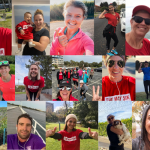- There is substantial evidence indicating that exercise can help manage symptoms of MS. It is also associated with a reduced relapse rate and slower disability progression.
- There are many community and environmental factors that that can influence exercise participation, including geographic location and access to services.
- A MS Research Australia funded researcher and her team have explored the influence of social communities and environments on exercise participation and promotion by engaging with different parts of the MS community.
The benefits of exercise in people living with MS
Studies have shown benefits of exercise training for the management of MS symptoms and the treatment of MS itself. It can help with movement, fatigue, balance, cognition (thinking and memory) as well as depressive symptoms. It has also been suggested to help reduce relapses and slow disability progression, and is considered to be one of the most effective things people can do alongside MS medications (see our recently published Physical Activity Guide for people with MS). However, there are a number of barriers preventing people from participating in exercise and it is important to note that for some people with MS, especially those with higher levels of disability, exercise can be very challenging. Promoting exercise is important to encourage participation in physical activity, not only for people with MS, but for the whole population.
What did the researchers investigate?
In MS Research Australia funded research, Dr Yvonne Learmonth, and her team explored exercise participation and promotion in the MS community living in regional or remote areas of Australia. Published in Disability and Rehabilitation, the team gathered perspectives from 64 people from different parts of the MS community, including people living with MS, carers, healthcare professionals and healthcare managers through interviews and focus groups. The MS community provided perspectives on factors associated with exercise participation, factors influencing the MS community’s promotion of exercise and motivators to increase exercise promotion.
What factors affect exercise participation in people living with MS?
For internal factors, the researchers found that all four groups within the MS community perceived symptoms of MS, such as cognitive problems and fatigue, to be the most common barriers preventing exercise participation. Some of the responses from people living with MS, carers and healthcare managers indicated that people had some fears related to the consequences of exercise, including safety, as well as social fears, such as going to a gym.
For external factors, people living with MS perceived that the cost of exercise and poor accessibility to community and exercise areas were common barriers to exercise engagement. Both people living with MS and carers acknowledged that high temperatures limited exercise options, and carers thought there was a lack of available expertise in MS and exercise. Healthcare professionals highlighted the burden on people living with MS and carers to travel to participate in exercise. It was also highlighted that healthcare professionals have scheduling restrictions and therefore limitations on travelling long distances to provide exercise and other healthcare options. Healthcare professionals also mentioned that people living with MS may face barriers in their social support network if carers were not supportive of or knowledgeable about exercising with MS.
For people living with MS who were not active, there were a number of factors influencing their decision to not exercise, including a lack of motivation towards exercise, unknown disease progression, cost, and limitations in the environment. They also commented on the geographical factors influencing exercise participation, including lack of services and how natural disasters can impact healthcare information access.
What factors affect exercise promotion in the MS community?
The researchers next looked at factors that may prevent carers, health professionals and healthcare managers from being able to facilitate or promote exercise to people with MS. All three groups noted the lack of awareness of available exercise services for people with MS, distance restrictions regarding healthcare professionals travelling to people with MS, as well as problems linked to assisting people with MS in travelling, and the availability and understanding of government funding.
What are some motivators to increase exercise promotion?
People living with MS indicated that they needed both infrastructure motivators, such as walking in parks and being able to access low cost equipment for exercise, alongside behavioural motivators. Many carers wanted training to learn how to motivate and understand what exercises may be important for people living with MS. Coincidentally, healthcare professionals stated that they wanted more opportunities to educate the MS community on what exercise and physical activity opportunities their profession can offer. They also highlighted the importance of good communication with people living with MS, and suggested telehealth could be used to increase exercise participation – a suggestion also made by healthcare managers to minimise travel costs. There were varying levels of support for accessing healthcare services via telehealth, but people living with MS and carers acknowledged that this could be a good option.
What does this all mean?
The researchers have identified new evidence on factors that influence the MS community’s participation and promotion of exercise, particularly in regional, rural and remote areas of Australia. This study makes an important contribution by including the perspectives of carers and recognising their potential influence in exercise participation. It also informs us that training on exercise should be provided to the wider MS community and exercise services should be considered locally and potentially delivered via telehealth too.
Physical activity guide for people with MS
MS Research Australia has put together a guide on physical activity for people living with MS. Clinical and research experts have been brought together to assess the current research findings, provide advice and evidence-based recommendations aimed at empowering people living with MS and potentially minimising the impact of MS on their lives. To see the guide, please click here.






